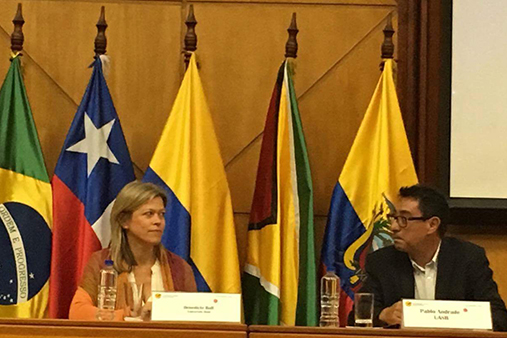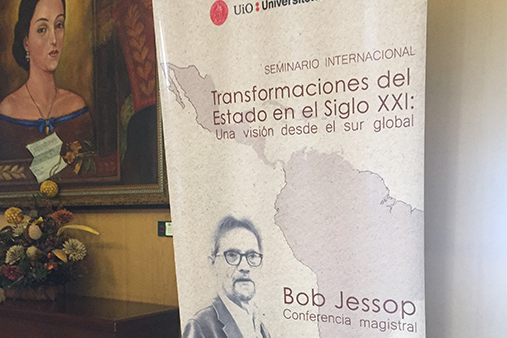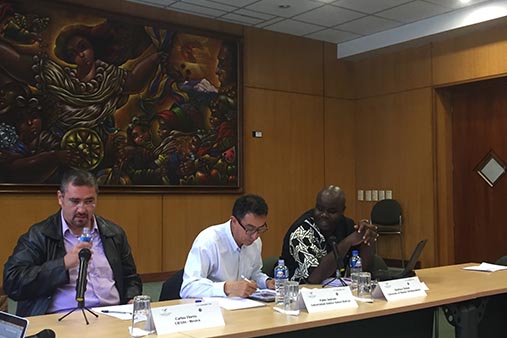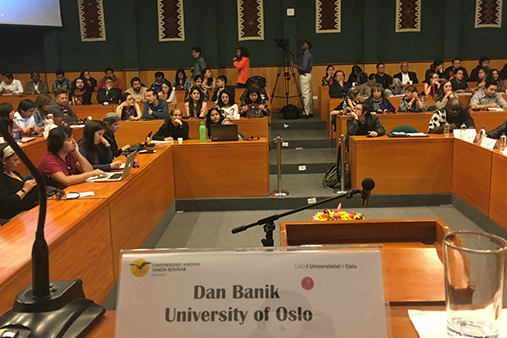How does the changing distribution of power and economic resources in the world condition the emergence of developmental states today? What impact does a stronger and more expansive China, a wobbly United States, and increasing tendencies towards inward looking strategies and protectionism have? Can theories developed to understand the developments of modern European states be used to understand the different forms of authority, legitimacy and state capacities in the Global South today? These were among the questions explored at a workshop organized on 6th and 7th of April by the Oslo Academy of Global Governance (OAGG), University of Oslo, and the Universidad Andina Simón Bolívar (UASB) in Quito, Ecuador.

The choice of Quito was not entirely coincidental as Ecuador is one of the rather small, developing countries that have pursued a conscious strategy of state building and development over the last decade, with significant achievements, but also some major Challenges. We were able to assemble scholars from Mexico, Brazil, Venezuela, Ecuador, Canada, Colombia, China, Malawi, Britain, Norway, Germany and India. The group included Bob Jessop, a leading scholar in the field of state theory, as well as established researchers and recent PhD graduates. Together they brought a wealth of empirical material to the debate. The purpose was both to explore particular experiences of the state in a new global order, and to find theoretical pathways to understanding state authority in contexts as different as those of Malawi, El Salvador, Venezuela and China. Bob Jessop (Lancaster University) and Dan Banik (University of Oslo) also gave public lectures on the role of the state in development in the 21st century, and filled a 300-seat auditorium of interested Quiteños.

Drawing conclusions is never easy, but some major findings stand out. The first relates to the role of China. China’s involvement in Africa and Latin America is often stereotyped as being motivated exclusively by economic and geostrategic concerns, unwittingly propping up authoritarian regimes in their quest to construct infrastructure and provide finance as well as labor. This is moreover argued to be conducted with no concerns for democratic governance, the environment or human rights. At the workshop, this portrayal was modified on several accounts. For example, in Venezuela there are signs that the Chinese are showing more caution regarding further economic support of the chavista regime as the deep political and economic crisis unfolds. In Malawi, Chinese aid has been sustained over several years despite the fact that Chinese firms on occasion experience loss of profit. In China, we also learned, there is a growing debate about aid modalities and goals. The picture is in other words one of variation across cases and over time, and more cross-regional comparative research is needed.

Another set of findings concerns new and old concepts of security threats and state monopolies on legitimate violence – often considered (following Weber) a defining feature of the modern state. Recently, many authors have argued that such a definition of the state excludes a majority of the world’s states – that in effect lacks such a monopoly. Thus, the majority of actual states are treated as an anomaly. A case in point here is Mexico where the state according to one participant was initially configured to accommodate “hegemonic power networks” including both representatives from the formal political and state institutions and organized crime. Thus, it is not the case that the Mexican state has lost a legal and legitimate monopoly of violence, or failed to achieve it. The state is set up to allow for the exploitation of legal as well as non-state and illegal power and resources. Similarly blurred lines are found in many other contexts, highlighting the need to rethink the very concept of the state and how it may serve developmental purposes.
A third issue worth mentioning is the “fetishing” of the “developmental state”. Formulated to explain the success of the East Asian states in generating industrialization and growth in the 1970s, the idea of the developmental state has evolved into a mantra in the advice given by development agencies as well as the discourse of politicians. However, it has been used in a myriad of different ways, and lost a lot of analytical clarity along the way. The authoritarianism of the East Asian states has also often been called upon to justify that industrialization strategies and attempts at establishing state control across the territory and different social groups have been followed by repression. Yet, whereas the dependence on authoritarian measures may be questioned, the requisite of industrialization was considered important by workshop participants, but ignored by many states. Particularly in Latin America, recent attempts at building stronger states have relied heavily on natural resource extraction and, benefited generously from the commodity boom induced by China’s appetite for raw materials. However, this has made the political projects underpinning the state building efforts vulnerable, as is increasingly clear now as commodity prices have dropped.

After intense days such as those in Quito, the overall impression is that the world is far too complex to fit into neat categories and theories. Nevertheless, it is important to develop concepts and theories as a means to compare experiences from different corners of the world and draw lessons for the future. In doing so, building on perspectives from all over the world is of crucial importance. For too long, perspectives developed in Europe and US have been allowed to dominate. Today, this is even less justified than it used to be as other centers of power and domination emergences. Yet, the answer is not to privilege some perspectives over others due to their geographical origin that one might argue matters less and less in a world where ideas circulate rapidly. The answer is rather cooperation and dialogue between scholars of different backgrounds and research experiences. For our part, the workshop in Quito is the first step in that direction. We promise publications and several further dissemination activities in the near future.




